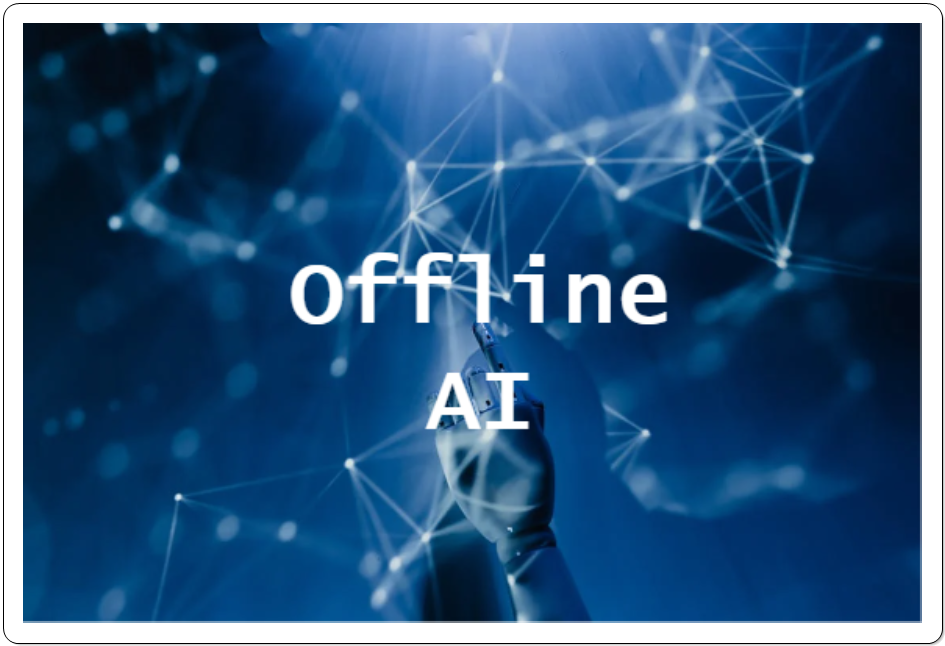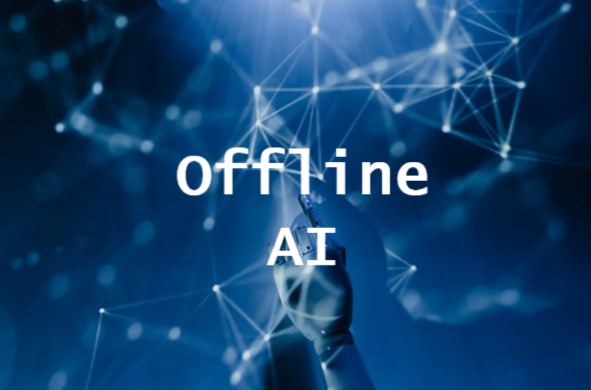HOW DOES AI WORK WITHOUT THE INTERNET?
Although AI has completely transformed our way of life, its dependence on the internet has limited its potential. In order to enable AI algorithms to be run locally on devices, researchers are now investigating methods to reduce the reliance of AI systems on the internet. This addresses issues of privacy, security, and dependability and opens new possibilities for places with little to no internet connectivity.
There is enormous potential for creativity and problem-solving when AI is applied offline. Even in rural or disaster-affected places, AI-powered services such as language translation, speech recognition, and autonomous cars can operate without internet connectivity. A decentralized AI ecosystem may be created by allowing devices to share and transfer the AI capabilities that these offline systems have created.
Understanding AI without Internet
The idea behind offline AI is to use AI to improve locations that have barely any internet access. It entails creating AI models and algorithms that can function without a continuous internet connection, opening doors for a range of sectors and companies without consistent or reasonably priced internet connectivity. Since machine learning algorithms need enormous quantities of data to train models, one problem in offline AI is allowing robots to learn and adapt without internet connectivity. Lightweight algorithms and models that can operate on low-power devices, such as smartphones or edge devices, are also necessary for offline AI.
However, because offline AI restricts the amount of real-time data that can be collected and processed, it may have an impact on the precision and dependability of AI predictions. Thus, in order to avoid biased or erroneous results, offline AI systems must be designed with appropriate protections and checks.
Deploying AI in internet-less contexts can provide chances for distant healthcare, agriculture, and education, but it can only be fully realized if its operational principles are understood. As technology develops, offline AI will be essential in closing the digital gap and extending the advantages of artificial intelligence to marginalized populations throughout the globe.
Technologies using AI without Internet
An artificial intelligence system that doesn’t require an internet connection has been unveiled by researchers at the University of Waterloo in Canada. Utilizing Darwinian evolutionary theory, they trained their robots to learn and function well with limited resources and sparse data by applying the “survival of the fittest” notion. Deep learning-based artificial intelligence (AI) software is already available for usage in smartphones, drones, and industrial robots. This technology enables devices to function without internet connectivity and secure neural networks.
The Movidus neural computing stick, developed by Intel in 2017, is a plug-and-play, cloud-independent tool for edge neural network deployment and prototyping that does not require an internet connection. Gesture-controlled drones and intelligent security cameras are the primary applications of this technology. Additionally, Google included this Movidus technology into their AIY vision kit for Raspberry Pi, which is used in industrial machine vision equipment, security cameras, and drones. The kit can recognize faces, objects, and animals.
A stand-alone offline AI reduces the cost of data transmission, improves security and privacy, and expands job prospects in places with little to no connectivity—mostly developing nations like North Korea, Vietnam, Egypt, and Cuba, among others. In Africa, just 28% of people have access to the internet, therefore data is a necessary component for AI systems to work. Initiatives must be connected to local communities and their varied demands in order to develop more AI technology for various African populations.
Working with farmers in rural Tanzania to understand the challenges they confront in sustaining continuous food production has allowed Google to set a successful example throughout Africa. The business developed a machine learning model that could be used directly on farmers’ phones, without the requirement for internet connectivity, to identify crop disease in cassava plants in its early stages. Given that Africa has the greatest linguistic diversity on the planet, Google AI Ghana is attempting to enhance natural language comprehension to support the more than 2000 languages that are spoken there.
The current generation depends on high-speed internet, yet certain areas are still behind owing to connectivity issues, which limits customers’ access to AI-based services. Businesses like Google and Intel are addressing these connection issues responsibly, and other businesses are being encouraged to do the same.
Offline AI presents both difficulties and possibilities for companies without dependable internet connection by offering tremendous potential for using artificial intelligence. It is possible to guarantee that everyone may benefit from AI, irrespective of their internet access status, by comprehending and creating offline AI.
Benefits
- Internet independence.
- Improved reachability in remote regions.
- Enhanced privacy and security.
- Enhanced productivity in industries with inadequate internet access.
Challenges of Using AI Without Internet
- Restricted Data Availability:
- AI systems need a lot of data to function well.
- AI systems could not have access to current and varied data sets if they are not connected to the internet.
- Absence of Real-Time Changes:
- AI systems may find it difficult to offer real-time updates and adjust to changing situations in the absence of internet access.
- AI models require real-time updates in order to learn and develop over time.
- Security and Privacy Issues:
- Using AI without internet access might lead to security and privacy issues.
- If you must work without internet access, you may need to find other ways to secure data and preserve privacy.
- Limited Scalability:
- Adding more hardware architecture and managing local resources may be necessary to scale AI systems without internet access, which would raise costs and restrict scalability.
Real world Applications
Offline AI is transforming a number of industries by offering practical solutions to practical problems. AI can help physicians diagnose conditions, interpret medical images, and develop treatment plans in isolated locations with inadequate internet connectivity. This makes it possible to receive high-quality care even when internet connectivity is limited. In order to protect people’s safety and security as well as that of their communities, surveillance systems can also use offline AI to identify suspicious activity and possible threats. It can also be used to build intelligent home automation systems in smart homes, which improve energy efficiency even in the absence of internet connectivity. It is essential to autonomous cars as well, allowing for smooth and safe travel even in places without internet connectivity.
Conclusion
AI has enormous promise in offline circumstances because it can analyze data locally, provide precise answers, increase availability, and guarantee privacy and security. One step regarding a more robust and inclusive future is the development of AI systems that don’t require the internet to function.

